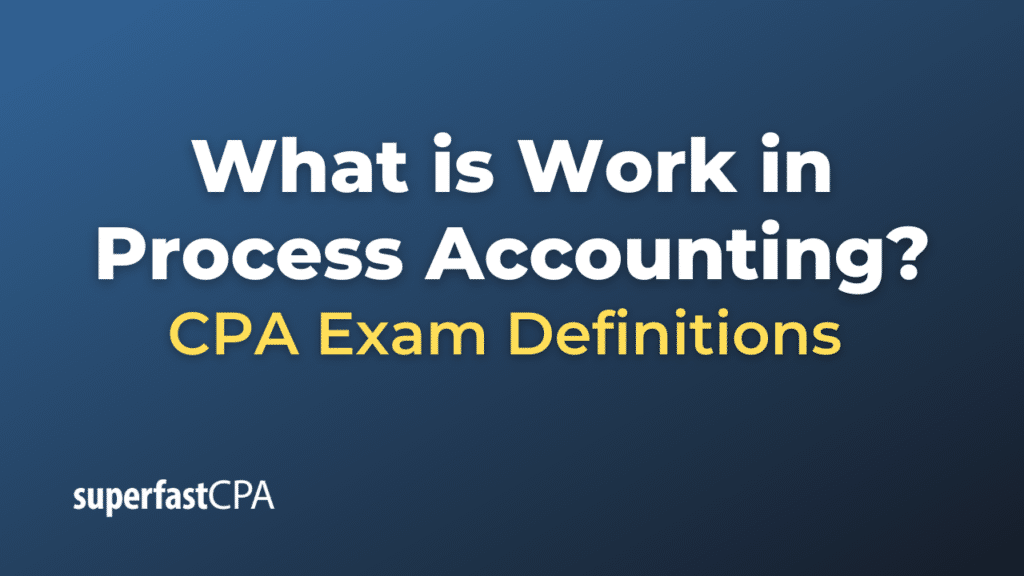Work in Process Accounting
Work in Process (WIP) accounting is a specialized form of accounting that tracks costs associated with production activities but that have not yet been completed. This is especially relevant in manufacturing settings where products are often in various stages of the production process. WIP is considered an asset on the company’s balance sheet because it represents materials, labor, and overhead that will eventually be sold as finished goods.
Components of WIP:
- Material Costs: The raw materials used in the unfinished goods.
- Labor Costs: Costs associated with the labor used to get the product to its current stage in the production cycle.
- Overhead Costs: Factory overhead, including utilities, rent, and other similar costs, that can be allocated to the production of the specific goods.
Accounting for WIP:
In WIP accounting, the costs of each of these components are carefully tracked and allocated to specific jobs or batches of products to determine the total cost of WIP inventory. At the end of an accounting period (monthly, quarterly, annually), the WIP accounts are adjusted to reflect the value of goods that have been completed and moved to finished goods inventory as well as the value of those that are still in the process.
Journal Entries:
Here is a simplified example of how WIP accounting might work:
- Beginning of Production: Materials and labor are allocated to a job.
- Debit Work in Process Inventory
- Credit Raw Materials Inventory
- Credit Wages Payable
- Application of Overhead: Factory overhead costs are allocated to the job.
- Debit Work in Process Inventory
- Credit Factory Overhead
- End of Production: When the job is completed, the costs are transferred from WIP to Finished Goods.
- Debit Finished Goods Inventory
- Credit Work in Process Inventory
Example of Work in Process Accounting
Let’s consider a fictional example to illustrate Work in Process (WIP) accounting for a company that manufactures custom bicycles.
CustomBike Co. takes an average of two weeks to manufacture a custom bicycle from start to finish. The company has several bikes in various stages of production at any given time.
Costs associated with manufacturing a single bike:
- Raw Materials: $200 (Frame, wheels, gears, etc.)
- Labor Costs: $100 (Assembling, welding, painting)
- Overhead Costs: $50 (Electricity, rent, indirect labor)
Accounting Process:
- Beginning of Production:CustomBike Co. starts production of a new bicycle. The raw materials worth $200 are moved to the production floor.Journal Entry:
- Debit Work in Process Inventory $200
- Credit Raw Materials Inventory $200
- Labor and Overhead Costs:By the end of the first week, labor costs of $50 and overhead costs of $25 have been incurred (since the bike is halfway through production).Journal Entry for Labor Costs:
- Debit Work in Process Inventory $50
- Credit Wages Payable $50
- Debit Work in Process Inventory $25
- Credit Factory Overhead $25
- Work in Process Inventory:At this point, the bicycle is not yet completed. The total WIP value for this bicycle is $275 ($200 for materials + $50 for labor + $25 for overhead).
- Completion of Production:By the end of the second week, the bike is completed. The remaining labor costs of $50 and overhead costs of $25 are incurred.Journal Entry for Remaining Labor and Overhead Costs:
- Debit Work in Process Inventory $75 ($50 for labor + $25 for overhead)
- Credit Wages Payable $50
- Credit Factory Overhead $25
- Transfer to Finished Goods:The bike is now completed and moves to the Finished Goods Inventory. The total cost of manufacturing the bike is $350 ($200 for materials + $100 for labor + $50 for overhead).Journal Entry for Completed Bike:
- Debit Finished Goods Inventory $350
- Credit Work in Process Inventory $350
Summary:
This example demonstrates how Work in Process (WIP) accounting tracks the costs associated with manufacturing goods that are not yet completed. It shows the journal entries for raw materials, labor, and overhead as they are allocated to WIP and then transferred to Finished Goods Inventory upon completion.













